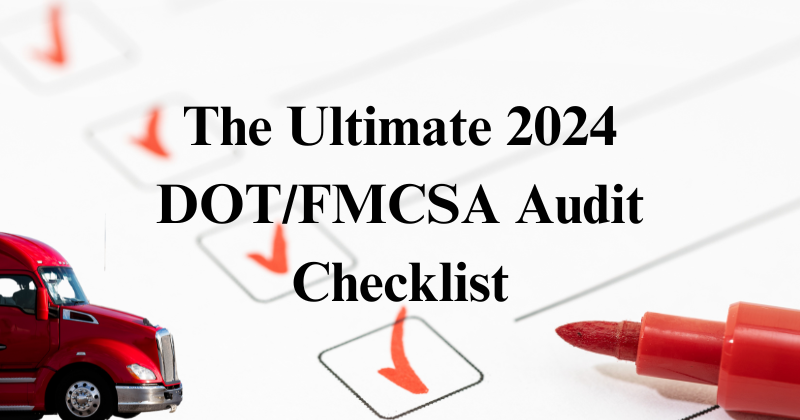Blog Layout
Expert Insights to Navigate Regulatory Changes and Ensure Compliance Success in the Trucking Industry
There are some major changes on the horizon for commercial trucking. As 2023 draws to a close, it’s critical that organizations set aside time to research the many regulatory updates that could take place throughout 2024. Below, we explore some of the most significant regulations and the proactive steps you can take to ready your commercial drivers.
1. FMCSA Safety Measurement System (SMS) Updates:
The FMCSA Safety Measurement System (SMS)
is undergoing significant revisions in 2024, impacting how carriers are evaluated for compliance. These revisions include reorganizing Behavior Analysis and Safety Improvement Categories (BASICs)
and simplifying severity weights. Carriers must understand these changes to ensure they meet regulatory requirements effectively and avoid potential penalties. Expert webinars and industry updates offer valuable insights into navigating these revisions and maintaining compliance standards.
2. CDL Drug and Alcohol Clearinghouse: Return to Duty Process:
Drivers with drug or alcohol violations face strict return-to-duty requirements
outlined by Title 49 CFR parts 40 and 382.
Beginning November 18, 2024, drivers with a "prohibited" status
in the FMCSA's Drug and Alcohol Clearinghouse
will lose or be denied their State-issued commercial driving privileges. Carriers must guide prohibited drivers through the re-evaluation process, including meeting with a DOT-qualified Substance Abuse Professional (SAP)
and completing recommended treatment and testing.
3. Mandatory Speed Limiters:
Speculation surrounds the implementation of mandatory speed limiters
for commercial vehicles, potentially impacting highway safety and operational efficiency. While specific regulations are pending, carriers should emphasize safe driving practices among their drivers and prepare for potential speed limiter mandates through proactive training and communication initiatives. Speed limiters have the potential to reduce accidents and fatalities on the road, but their implementation may also affect delivery schedules and overall fleet productivity.
4. Competency and Skills Testing:
The consideration of competency testing
for commercial drivers emphasizes the importance of ensuring driver qualifications and adherence to federal regulations. Carriers should advocate for comprehensive skills testing
to enhance safety standards across the industry. Staying informed about proposed rulemaking and industry developments is crucial for navigating these changes effectively. By implementing rigorous testing procedures, carriers can ensure that their drivers possess the necessary skills and knowledge to operate commercial vehicles safely and efficiently.
5. UCR Fees Anticipating Increase in 2024:
Unified Carrier Registration (UCR)
fees are expected to increase for the 2025 registration year,
posing financial challenges for carriers. Carriers should budget and plan accordingly to meet these financial obligations and understand the implications of fee changes. Staying proactive in compliance efforts is essential for maintaining operational efficiency and financial stability. Carriers may need to adjust their budgeting and financial planning strategies to accommodate these increased fees, which could include seeking cost-saving measures or exploring alternative revenue streams.
6. California AB5 Independent Contractor Legal Battle:
Ongoing legal battles surrounding California's AB5 legislation
pose challenges for owner-operators in the trucking industry. Carriers should stay informed about legal developments and potential impacts on business operations. Advocacy efforts and industry collaboration are crucial for navigating regulatory uncertainties effectively. The outcome of these legal battles could have significant implications for the trucking industry in California and beyond, potentially reshaping the landscape of independent contractor relationships.
7. Fix DataQ System When Reviewing Appeal Requests:
Proposed improvements to the DataQ system
aim to enhance regulatory transparency and accountability. Engaging in the comment process allows carriers to advocate for fair and effective appeal mechanisms. Ensuring accurate and timely resolution of appeal requests is essential for maintaining compliance and regulatory integrity. By participating in the comment process, carriers can contribute to the improvement of the DataQ system and ensure that their concerns are addressed in a timely manner.
8. CMVs Electronic IDs:
Proposed rules requiring electronic identification systems
for commercial motor vehicles aim to enhance roadside inspection efficiency and enforcement capabilities. Carriers should monitor developments in this area to ensure readiness for potential regulatory mandates. Implementing electronic ID systems can streamline compliance efforts and improve operational efficiency. Electronic ID systems have the potential to revolutionize roadside inspections and enhance overall safety and security within the trucking industry.
9. Automatic Emergency Braking:
The proposal for automatic emergency braking systems
on commercial vehicles represents a significant advancement in vehicle safety standards. This requirement aims to mitigate the risk of accidents by equipping vehicles with technology that can automatically apply brakes in emergency situations. Carriers should prepare for potential equipment upgrades to meet proposed regulatory requirements. While some stakeholders may express concerns about the cost and implementation challenges associated with this technology, the potential safety benefits outweigh these considerations. Investing in advanced safety technologies such as automatic emergency braking can significantly reduce the incidence of accidents and enhance overall fleet safety.
10. Transparency in Property Carrier Broker Transactions:
Proposed rulemaking seeks to enhance transparency in property carrier broker transactions and promote fair practices within the industry. Carriers should stay informed about regulatory developments and advocate for equitable policies. Transparency and accountability in broker transactions are essential for maintaining trust and integrity within the supply chain. Carriers should actively participate in the regulatory process to ensure that their interests are represented and that fair and transparent practices are upheld. By working collaboratively with regulators and industry stakeholders, carriers can contribute to the development of policies that foster a level playing field and support sustainable growth in the trucking industry.
Conclusion:
These elaborations provide a deeper understanding of the regulatory changes and challenges facing the trucking industry in 2024. By staying informed and proactive, carriers can navigate these changes effectively and ensure compliance with regulatory requirements while prioritizing safety and efficiency.
About RoadLink Recruiters:
RoadLink Recruiters
is your trusted partner in navigating the complex landscape of DOT safety and compliance. With our team of experts, we offer tailored guidance and support to ensure your operations meet and exceed industry standards. Ready to elevate your safety program and compliance strategy? Book a free DOT safety and compliance strategy session
with us today. Let us help you navigate the road ahead with confidence and expertise.
Insights & Resources: Stay Informed with Our Latest Blogs
Ready to accelerate your CDL driver recruitment and ensure safety compliance?
Are you a skilled CDL driver looking for new opportunities? Or perhaps you're a carrier in need of reliable drivers for your fleet? Look no further! Contact RoadLink Recruiters today to find the ideal match for your recruitment and safety needs. We want to connect you with the perfect driver or carrier that suits your requirements and aspirations.
CONTACT US
Headquarters
100 Hartsfield Centre Parkway
Atlanta, GA 30354
USEFUL LINKS
DISCLAIMER: RoadLink Recruiters does not represent nor claim that we are endorsed by the U.S. Government or FMCSA. The use of our service(s) is NOT required by FMCSA. RoadLink Recruiters is in no way associated with the FMCSA, its affiliates, or the U.S. government.
© 2024
RoadLink Recruiters. All rights reserved.


